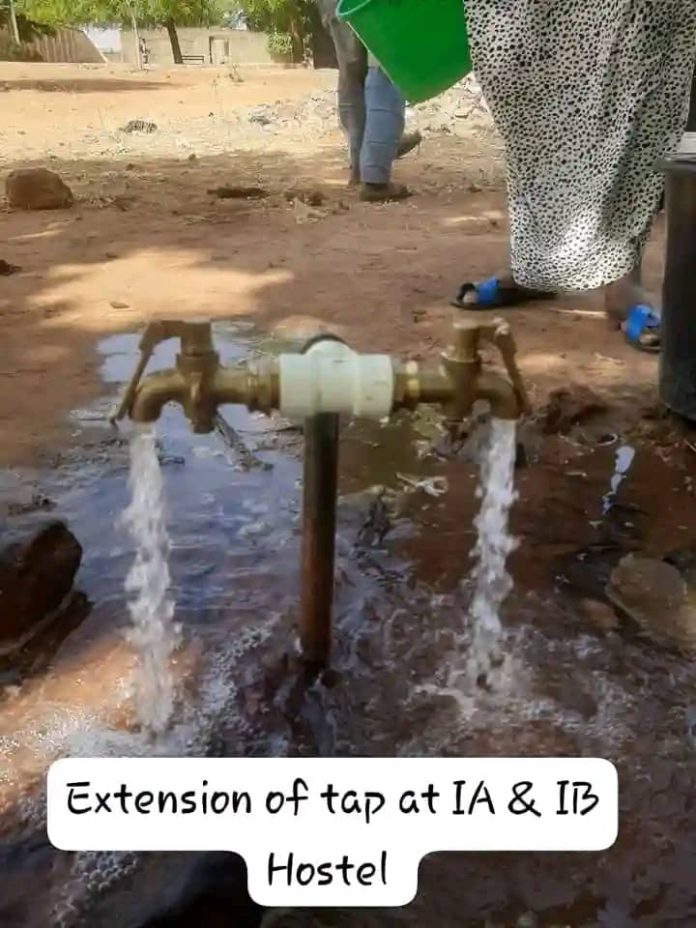By: Abdulrasaq Kamaldeen
Stuck with the sad reality of water scarcity amidst the scorching sun at Usmanu Danfodiyo University Sokoto (UDUS), Jimoh Hassan, a resident of Block E at Jubril Aminu Hostel, UDUS, decried his daily battle as lack of adequate water became a grueling challenge for him. Thriftless beyond hygienic routines; the scarcity of water escalated to a dispute among students competing for limited water resources.
“We always go to the reservoir before we can get water to wash our clothes,” Jimoh told the Harbinger
Jimoh lamented the arduous journey he and many students pass through to secure water, oftentimes fetching from other blocks. Adding that even when their (other blocks) tank had water, its discoloration rendered it undrinkable—compounding the woes faced by the majority of students.
“I faced a lot of challenges due to the lack of adequate water in our hostel. The water from our tank is not drinkable, so I have to trek down to another block that has clean and available water,” Jimoh said.
The occupants of Jubril Aminu and neighboring hostels at UDUS have long grappled with the challenges of unstable water supply. The situation, however, improved with the implementation of the recent project, executed by the Students’ Union Caretaker Committee (SU-CTC), now easing the water scarcity that students had been battling with.
Before the project, 30% of students had battled with water difficulties; some went to classes without bathing, and some used to fetch unclean water from the reservoir. This has spurred persistent illness in several students, while many students bought sachet water to escape the plight of water scarcity, before the project implementation.
SU-CTC Transforms Challenges into Solution
Responding to the distress signals from students facing intermittent water supply, the SU-CTC took decisive action to ensure the student’s well-being.
The chairman of the committee, Abdullahi Sanusi, a 500-level law student, emphasized that unstable water supply was a major plight for students, catalyzing the comprehensive project.
The male hostels that benefited from the project are Block A, C, E, and Zoo Block of Jubril Aminu hostel. While Kano, Zamfara, IA, IB, and IC claimed the beneficiary among the female hostels.
Speaking with our Reporter, Abdullahi Sanusi affirmed the project’s focus on alleviating water-related challenges, “Water is a major problem to those hostels.”
“We bought three 3000-litre tanks. One for each Block A, C, and E of the hostels. We equally installed one at the Zoo Block because there was no tank in the hostel before now. And we added one tank to each IA, IB, and IC Block of the female hostels,” Abdullahi stated. Adding “More than 40 new taps were installed in both male and female hostels. Additionally, we bought two new water pumping machines and repaired three at Zamfara, Kano, IA, IB, and IC Blocks.”
Students React
A 300-level Primary Education student, Oyewole Kehinde Nafisat, residing in IC Block expressed her satisfaction with the restoration of water.
Oyewole emphasized the positive development—including the covered and tied reservoirs that enhanced water usability.
In her words: “The restoration is a very good development. It makes us have stable water. Our reservoir was also covered and tied so that the water will be useful for cooking.”
“They even installed a plumbing machine to the reservoir, so that whenever there is no light, we will be able to have access to the water.” she expressed.
Speaking with another student, Zakariyah Kabirat at 300-level in the History department and an occupant of IA Block echoed the sentiment of happiness and relief.
According to her, the completion of the projects not only provided more water for various needs but also reduce thed misunderstandings and disputes among students.
“I’m very happy about the restoration. Initially, the number of students was much greater than the water. This naturally causes misunderstanding between us, which sometimes leads to disputes.”




